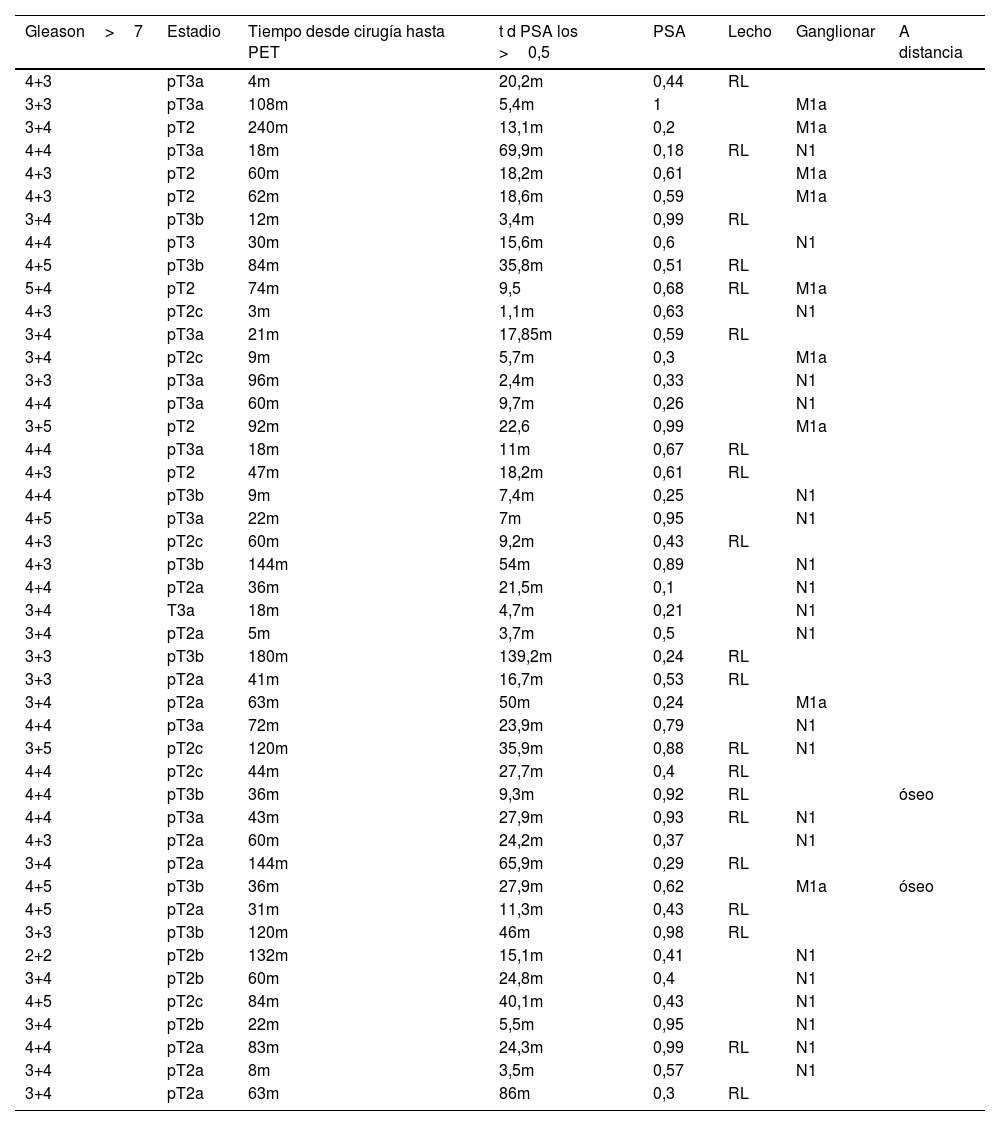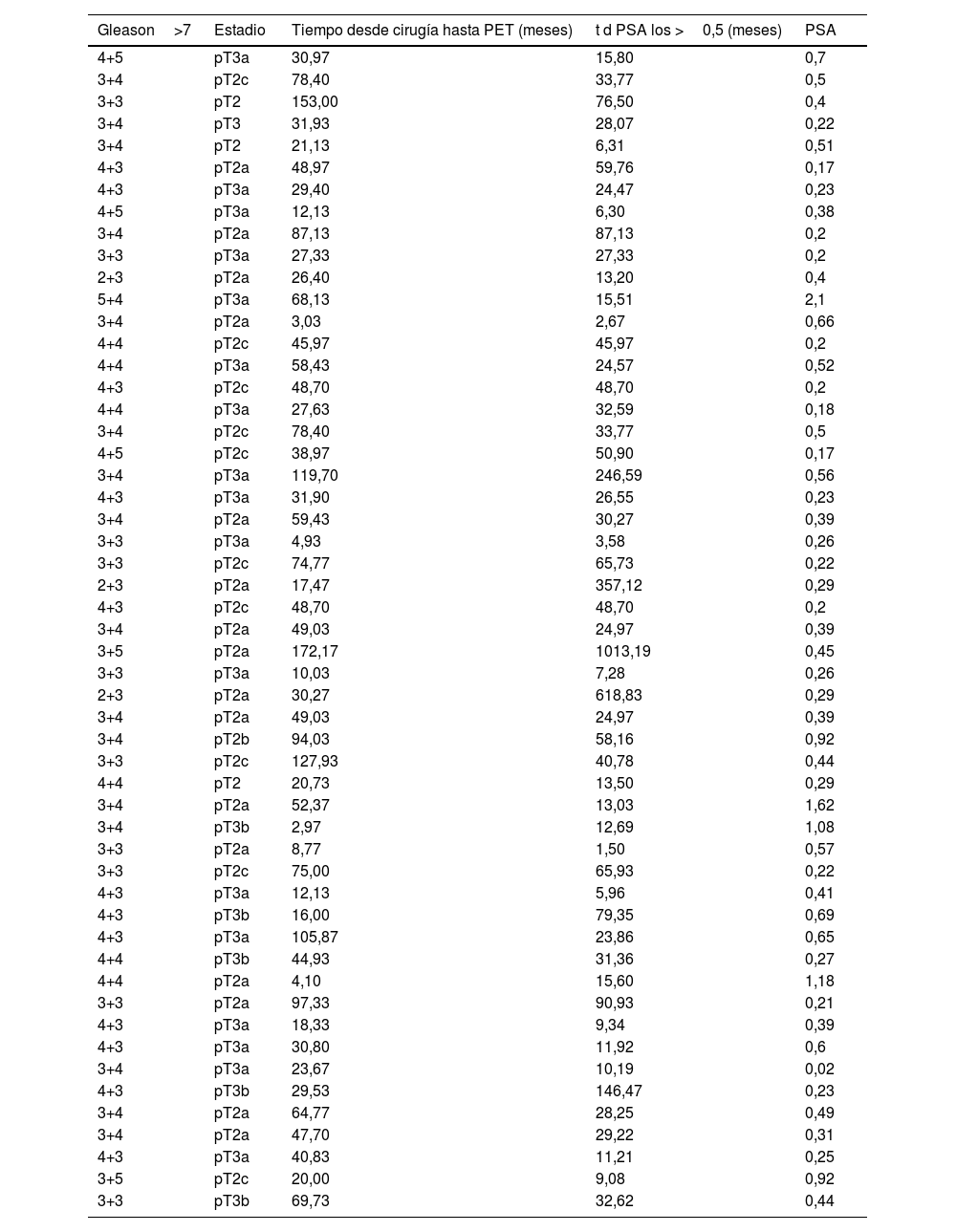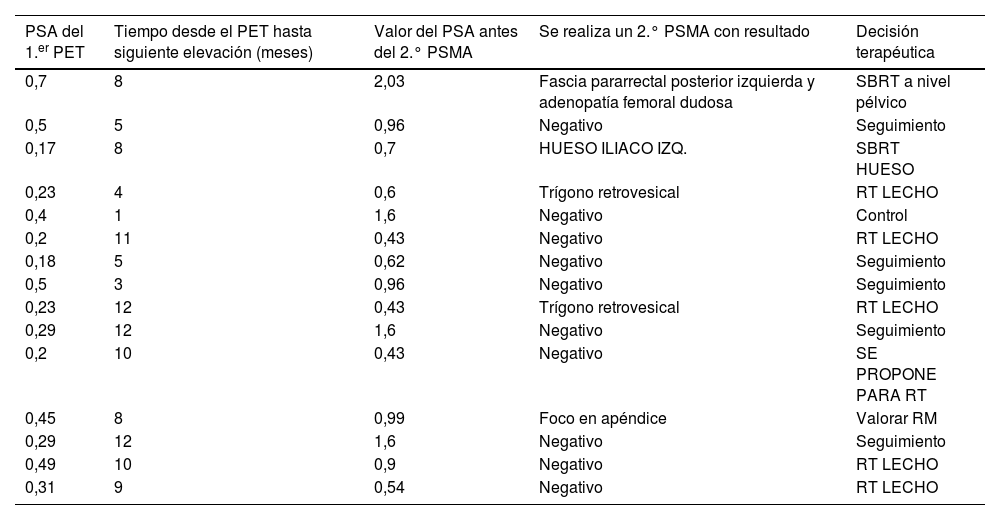Evaluar el valor clínico de un PET/TC con [18F]F-PSMA negativo, en pacientes diagnosticados de cáncer de próstata tratados con prostatectomía con elevación del PSA inferior a 1ng/ml, en los resultados de la radioterapia de rescate.
MétodoIncluimos prospectivamente 98 pacientes diagnosticados de cáncer de próstata tratados con prostatectomía que presentan recidiva bioquímica (PSA medio 0,51ng/ml [0,17-1,0ng/ml]) y han acudido para la realización de un [18F]F-PSMA-PET/TC.
La [18]F-PSMA-PET/TC fue negativa en 53/98 pacientes (54,09%). Se analizaron las diferencias entre los que se consideraron o no candidatos a radioterapia de rescate pélvica (RTR), a decisión del comité y consentimiento del paciente, con seguimiento durante al menos un año. La respuesta al tratamiento se definió como reducción del PSA del 50%. La recurrencia se determinó en base al seguimiento clínico, analítico y de imagen.
ResultadosEl 54,7% (29/53) de los pacientes con [18F]F-PSMA-PET/TC negativo se sometieron a RTR. De ellos, el 93,1% (27/29) demostraron respuesta al tratamiento (falsos negativos del PSMA). Los otros dos mostraron cifras oscilantes del PSA, sin detectarse enfermedad en las exploraciones [18F]F-PSMA-PET/TC de seguimiento.
El 45,3% (24/53) de los pacientes con [18F]F-PSMA-PET/TC negativo no se sometieron a RTR. De ellos se objetivó una elevación progresiva del PSA en el 62,5% (15/24) (falsos negativos del PSMA), localizando la recidiva con seguimiento por [18F]F-PSMA-PET/TC en 4 pacientes. Los 9 pacientes restantes (37,5%) mostraron niveles de PSA fluctuantes sin que la [18F]F-PSMA-PET/TC mostrara enfermedad.
Se han confirmado 42 falsos negativos del [18F]F-PSMA-PET/TC (42,85%).
ConclusiónLos pacientes diagnosticados de cáncer de próstata con recidiva bioquímica post-prostatectomía con estudio [18F]F-PSMA-PET/TC negativo tienen posibilidades de beneficiarse de la radioterapia de rescate pélvica, con respuesta en el 93,1%.
To assess the clinical value of [18F]F-PSMA negative PET/CT, in patients diagnosed with prostate cancer treated with prostatectomy with elevated PSA less than 1ng/mL, on the outcome of salvage radiotherapy.
MethodWe prospectively included 98 patients diagnosed with prostate cancer treated with prostatectomy with biochemical recurrence [mean PSA 0.51ng/mL (range 0.17-1,0ng/mL)] who were referred for an [18F]F-PSMA-PET/CT study.
The [18F]F-PSMA-PET/CT scan was negative in 53/98 patients (54.09%). Differences were analysed between those patients who were or were not candidates for pelvic salvage radiotherapy (PSRT) decided upon multidisciplinary committee and patient consent, with a minimum follow-up time for 1year. Response to treatment was defined as a 50% reduction in PSA levels. Recurrence was ascertained upon clinical, analytical and imaging follow-up outcomes.
Results54.7% (29/53) of the patients with a negative [18F]F-PSMA-PET/CT underwent PSRT. Of these, 93.1% (27/29) patients demonstrated response to treatment (PSMA false negatives). The remaining two patients showed fluctuating PSA levels without detecting disease on the [18F]F-PSMA-PET/CT follow-up study.
45.3% (24/53) of patients with negative [18F]F-PSMA-PET/CT did not undergo PSRT. Of these, progressive PSA elevation was observed in 62.5% (15/24) (PSMA false negatives), localising recurrence on the [18F]F-PSMA-PET/CT follow-up study in 4 patients. The remaining 9 patients (37.5%) showed fluctuating PSA levels without detecting disease on the [18F]F-PSMA-PET/CT follow-up study.
Our series confirmed 42 (42.85%) [18F]F-PSMA-PET/CT false negatives cases.
ConclusionPatients diagnosed with prostate cancer with post-prostatectomy biochemical recurrence and a negative [18F]F-PSMA-PET/CT study are likely to benefit from pelvic salvage radiotherapy, with response seen in 93.1% of our cases.
Artículo
Comprando el artículo el PDF del mismo podrá ser descargado
Precio 19,34 €
Comprar ahora














